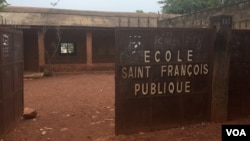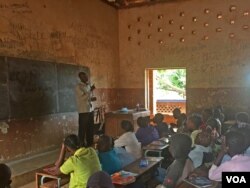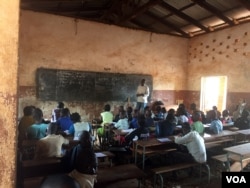In the Central African Republic, armed groups have occupied, looted and damaged schools, preventing thousands of children from getting their education, according to a report released by Human Rights Watch. The country has been in crisis since late 2012, with militias controlling much of the countryside.
School buildings are preferred by armed groups for use as bases or barracks as they are typically the most solid structures in town.
But according to Aboubacry Tall, the interim representative for UNICEF in the CAR, this basically means the whole country is running at a sub-optimal level.
“When children cannot go to school, they end up in the streets and they become vulnerable to all kinds of things, including being recruited into and pressed into service by the armed groups.... What it means is we are basically building the kind of citizen that we would not want to run into in a dark corner on a street somewhere,” said Tall.
Lawlessness in rural areas
CAR government forces maintain little control outside the capital Bangui. In the countryside, Christian and Muslim armed militias fight between themselves for mineral resources and trade routes. Bandits and other forces like the Lord’s Resistance Army also take advantage of the poor security situation.
Human Rights Watch researcher Lewis Mudge traveled throughout the CAR in November 2016 and January 2017 investigating access to schools.
Mudge found even if the fighters were just outside the school, the students still could not, or would not, attend. Some children would have to pass by militia members who killed members of their family.
“We found just scores of children who spoke about how this had reduced self-worth, how they felt like they had no future, how they used to have big dreams and do not anymore,” Mudge said.
The Saint Francois public primary school in Bangui was occupied by anti-Balaka militia in December 2013. They used it as a barracks, said school director Edouard Pere.
He said they destroyed all the material. They broke the students’ desks. Students have to sit on the ground. They destroyed the library. They took all the books. They left the school in a very bad state.
Child recruitment
Pere said the militia was also recruiting children into their ranks and giving them weapons. The militia left the school in late 2015. After rehabilitation funded by the government and UNICEF, the school reopened in February 2016 with about 2,500 students now back in class.
But it is a different story outside the capital, said Eugenne-Lucienne Ngbondo, a senior official at the Ministry of Education.
She said there are schools that do not work at the moment, but the government is working to liberate the schools.
The Ministry of Education negotiates with armed groups, sometimes using U.N. peacekeepers as mediators, to try to get the rebels to leave the schools.
Mudge said the number of occupied schools has decreased thanks in part to an initiative started last year by the U.N. mission, MINUSCA.






